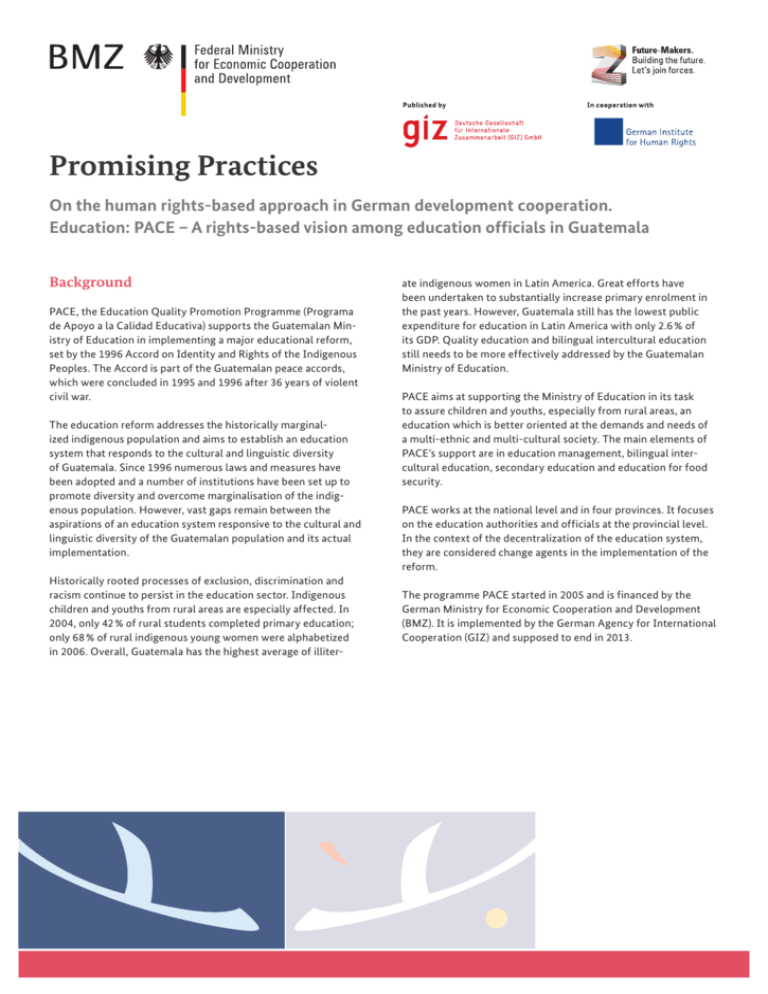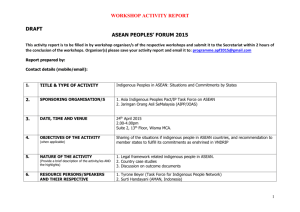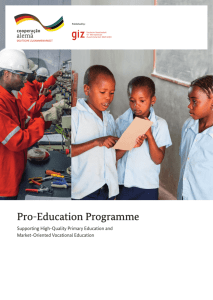PACE - Deutsches Institut für Menschenrechte
advertisement

Promising Practices On the human rights-based approach in German development cooperation. Education: PACE – A rights-based vision among education officials in Guatemala Background PACE, the Education Quality Promotion Programme (Programa de Apoyo a la Calidad Educativa) supports the Guatemalan Ministry of Education in implementing a major educational reform, set by the 1996 Accord on Identity and Rights of the Indigenous Peoples. The Accord is part of the Guatemalan peace accords, which were concluded in 1995 and 1996 after 36 years of violent civil war. The education reform addresses the historically marginalized indigenous population and aims to establish an education system that responds to the cultural and linguistic diversity of Guatemala. Since 1996 numerous laws and measures have been adopted and a number of institutions have been set up to promote diversity and overcome marginalisation of the indigenous population. However, vast gaps remain between the aspirations of an education system responsive to the cultural and linguistic diversity of the Guatemalan population and its actual implementation. Historically rooted processes of exclusion, discrimination and racism continue to persist in the education sector. Indigenous children and youths from rural areas are especially affected. In 2004, only 42 % of rural students completed primary education; only 68 % of rural indigenous young women were alphabetized in 2006. Overall, Guatemala has the highest average of illiter- ate indigenous women in Latin America. Great efforts have been undertaken to substantially increase primary enrolment in the past years. However, Guatemala still has the lowest public expenditure for education in Latin America with only 2.6 % of its GDP. Quality education and bilingual intercultural education still needs to be more effectively addressed by the Guatemalan Ministry of Education. PACE aims at supporting the Ministry of Education in its task to assure children and youths, especially from rural areas, an education which is better oriented at the demands and needs of a multi-ethnic and multi-cultural society. The main elements of PACE’s support are in education management, bilingual intercultural education, secondary education and education for food security. PACE works at the national level and in four provinces. It focuses on the education authorities and officials at the provincial level. In the context of the decentralization of the education system, they are considered change agents in the implementation of the reform. The programme PACE started in 2005 and is financed by the German Ministry for Economic Cooperation and Development (BMZ). It is implemented by the German Agency for International Cooperation (GIZ) and supposed to end in 2013. Towards a Human Rights-based approach The education reform opened up the opportunity to rebuild the Guatemalan education system from scratch and to render it responsive to the pluralistic Guatemalan society. Instead of taking a top-down approach in education planning and management, the reform promoted decentralization and participatory approaches in order to engage indigenous communities and civil society in the process of establishing this new education system and designing its contents. The reform stipulated a culturally and linguistically pertinent curriculum with new materials, like school books, and the empowerment of teachers as well as education officials to implement the new educational policy. Such a reform requires governmental education officers and teachers to change their attitudes and behaviour. This remains an enormous challenge. Designing the education system from a human rightsbased perspective entails a vision of an inclusive educational system. This implies that the human rights of all peoples in a diverse society are being realised, giving special attention to the most vulnerable groups, like indigenous peoples in rural areas as well as girls and children with disabilities. Process In 2010, PACE took the initiative to train education officers in how to adopt a human rights-based approach in their daily work context. A representative baseline-study was carried out in the four provinces. The study aimed to assess education officers’ knowledge of the right to education and its implementation. Their awareness regarding the discrimination of girls as well as of indigenous people was also evaluated. In addition, the study investigated how education officers would react when confronted with certain scenarios, likely to involve human rights violations, such as the non-admission of students or the transferral of teachers, leading to situations where students temporarily lack a teacher. The study showed a considerable lack of knowledge among government officers regarding the contents and application of human rights and the right to education, in particular. In fact, only a few of them could name relevant human rights conventions and understood their implications for their work. The right to education, in particular, was mainly associated with the free availability of and access to education while education quality was not considered to be an inherent element of the right to education. The results of the baseline-study were discussed in a meeting with high and middle ranking officers of the educational directorates in the four provinces. The limited circle of participants allowed for a confidential debate about the results in order to identify causes and potential solutions. This lively and constructive process was essential for motivating the participants to accept ownership over the results. Participants also became interested in acquiring a deeper understanding of the rightsbased approach to education. 2 Human rights framework Art. 14 of the UN Declaration on the Rights of Indigenous Peoples of 2007 stipulates that indigenous peoples have the right to establish and control their educational systems and provide education in their own languages and in a manner appropriate to their cultural methods of teaching and learning. The Declaration sets out that States shall, in conjunction with indigenous peoples, take effective measures to ensure that indigenous individuals, particularly children, including those living outside their communities, have access to an education in their own culture and which is provided in their own language. Declarations by the UN General Assembly are non-binding. However, declarations are used to interpret binding human rights instruments, like the International Covenant on Economic, Social and Cultural Rights (ICESCR). Thus the UN Declaration on the Rights of Indigenous Peoples has acquired legal significance and impact. Art. 13 of the ICESCR establishes the right of everyone to education. Art. 14 obliges State Parties to introduce compulsory primary education free of charge for all. Education has to be available, accessible, acceptable, and adaptable. Education must be physically accessible and economically affordable to all, especially to the most vulnerable persons and groups, in law and in fact. Acceptability relates to the form and substance of education, including curricula and teaching methods. The latter have to be of good quality, relevant to and culturally appropriate for students and, to a certain degree, parents. Adaptability entails that education has to be flexible enough to adapt and respond to the needs of students within diverse social and cultural settings. Human rights standards are complemented with cross-cutting human rights principles: non-discrimination and equality of opportunities. Based on the study, PACE supported the development of a blended-learning training course on the human rights-based approach to education in Guatemala. The course was offered to education officials in the four provinces. Its objective was to broaden the participants’ perspective and to deepen their critical awareness and interpretation capacity with regard to human rights and the implementation of the right to education in their own work. It is most important that education officers understand the relationship between the right to education and the rights of indigenous peoples in the Guatemalan context. They should be enabled to implement the right to education in their provinces, taking into account factors like cultural and linguistic diversity, social status, rural context, age and gender. The training programme was organized as a continuous process, consisting of three workshop sessions of one day and a half, spread out over a period of two months. This combination allowed participants to confront their learning experience with the reality of their daily work. To complement these intensive sessions and promote further interaction among participants of these four provinces, PACE set up an e-learning platform. The methodology was intended to stimulate a constructive debate among participants with different professional backgrounds and from different ethnic groups. The training programme included discussions and group work as well as the analysis of case studies, reading material and films. Critical reflection and analysis was strongly encouraged. For example, after the first session participants were invited to analyse the Report of the Special Rapporteur on the Right to Education of his visit to Guatemala in 2008. Participants discussed their opinions on the report on the e-learning platform. Another task was to formulate a project proposal for the application of the right to education within their province. Between 2011 and 2012, 211 participants registered for the training programme and 196 successfully completed it. There was a wide range of participants, such as technical and administrative staff as well as local school inspectors. Overall, the participants were highly satisfied with the training programme, emphasising their increased awareness and understanding with regard to the human rights-based approach and its application in their work context. They also appreciated the exchange of experiences with colleagues from other departments and regions. In addition, in one province, six pedagogical advisors and two local school inspectors who had taken part in the training programme, took the initiative to train 150 teachers and 50 school directors in the human rights-based approach to sensitize them with regard to their teaching practice. For this purpose, PACE supported them to elaborated training guidelines. Finally, 29 education officers from the Directorate of Monitoring and Verification of Quality at the national Ministry of Education were trained in 2012. Since 2010, approximately 43 % of the target group in four provinces has taken part in these trainings. The training modules received the full support of high-level officials of the education authorities, and several sub-directors took part in the training. This high-level support and involvement also demonstrated to other participants that the right to education was something that is taken seriously by their superiors. Challenges It is a long-term process to implement a new way of thinking and acting within the education system. It is a challenge for teachers and education officials to put the human rights-based approach to education into practice: Legal and administrative parameters still need to be adapted and, most importantly, the political vision and discourse with respect to the rights of indigenous peoples need to change. Many teachers and education officials still hold quite biased interpretations of social reality, and traditional and religious conceptions still shape their views – issues, such as the discrimination of girls and women are thus seen through a very different lense. In addition, the structure of the diploma remains a challenge: The more actors are part of the steering structure of the diploma, the clumsier and less flexible it gets. Teacher and pupil in Guatemala. Photo: © GIZ/Jürgen Farenholtz 3 Contact person Juliane Osterhaus, juliane.osterhaus@giz.de Photo: © PACE/Mirena Martínez Teachers of PROFE Luis Enrique Lopez-Hurtado luis.lopez-hurtado@giz.de Lessons learnt Engaging provincial education officials as duty-bearers has proven to be a successful strategy. They are the key actors if substantial changes are to be introduced into the education system. In terms of sustainability, the baseline-study showed that 54 % of the education officials included in the study have been working in the Ministry of Education for the past twelve years or more. Therefore, it is worth investing in this critical mass of education officials! Having conducted a baseline-study at the beginning provided for a helpful starting point. It allowed for the presentation of well Published by Deutsche Gesellschaft für Internationale Zusammenarbeit (GIZ) GmbH Registered offices Bonn and Eschborn, Germany Cross sectoral programme ‘Realising Human Rights in Development Cooperation’ Dag-Hammarskjöld-Weg 1 - 5 65760 Eschborn, Germany T +49 (0)61 96 79 - 1523 F +49 (0)61 96 79 - 801523 sv-menschenrechte@giz.de www.giz.de Layout Ira Olaleye As at November 2012 GIZ is responsible for the content of this publication. researched evidence on the state of knowledge and implementation of the right to education. Furthermore, it was essential for getting the target group interested and involved in the issue from the start. The participatory nature of the strategy has proven to be a crucial factor for creating ownership. Complementing this approach with targeted work with rightsholders, in particular children and parents of indigenous communities, and promoting mutual encounters between rightholders and duty-bearers, would further promote human rights principles, such as participation, transparency and accountability. In cooperation with German Institute for Human Rights Zimmerstraße 26/27 10969 Berlin, Germany On behalf of Federal Ministry for Economic Cooperation and Development (BMZ) Division Human rights; gender equality; culture and development Addresses of the BMZ offices BMZ Bonn Dahlmannstraße 4 53113 Bonn, Germany T +49 (0)228 99 535 - 0 F +49 (0)228 99 535 - 3500 poststelle@bmz.bund.de www.bmz.de BMZ Berlin Stresemannstraße 94 10963 Berlin, Germany T +49 (0)30 18 535 - 0 F +49 (0)30 18 535 - 2501









